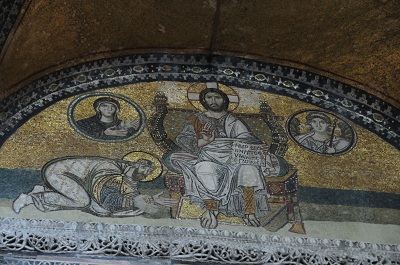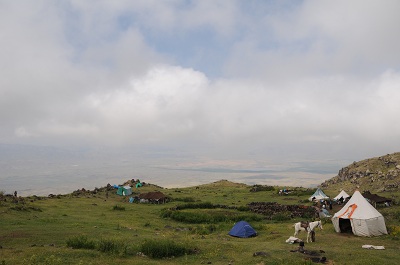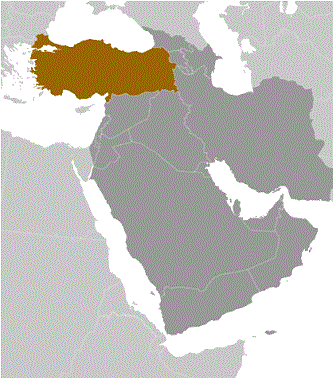Turkey
From Mount Ararat to Antioch, Tarsus and Colossae, from the seven churches of Revelation, to the Island of Patmos where the book of Revelation was written, the area of present-day Turkey has a rich biblical history.

A mural of Jesus in the Hagia Sofia in Istanbul. The Hagia Sophia, which means “Holy Wisdom,” was a Christian church, then a Muslim mosque, and now is a museum. (Photo by Gary Fallesen)
In spite of this heritage, 99.8 percent of the population is considered to be Muslim. Even with the vast majority of Turkey’s citizens claiming allegiance to Islam, Turkey considers itself a secular state. However, one need look no further than the nation’s flag (with the Muslim symbol of the crescent moon and star) or the Sultan Ahmed Mosque in Istanbul (the national mosque of Turkey) to see that this is not completely accurate.
For thousands of years the area of what is now Turkey has dominated in power and position. Being located between the Black Sea and the Mediterranean Sea has had a large influence on Turkey’s political and geographical prominence in history. However, this has also led to some difficulties for the nation as well. When developing foreign policies and alliances, the fact that Turkey is a part of Europe and the Middle East has challenged the leadership. In addition, being a predominantly Muslim country, coupled with an ancient history of fighting “Christian” Europe makes it seem almost like treason to align themselves or even work with Europe. One other long-standing internal struggle Turkey has faced is the division between the Kurds and the Turks.
Within Turkey lies 40 percent of the Kurdish people. There has long been conflict and contention between these two peoples. The Kurdish people were actually promised a homeland at the end of World War I, but it was never given to them.
Climbing For Christ is working the mountains of eastern Turkey with the Kurdish people. Our prayer is that the Kurdish Christians would grow in truth, in love, and in number.
— Jordan Rowley, Spiritual coordinator, Climbing For Christ

A group of Kurdish nomads on Mount Ararat. (Photo by Gary Fallesen)
Fast Facts
Location: Turkey is located in Southeastern Europe and Southwestern Asia (that portion of Turkey west of the Bosporus is geographically part of Europe. Leader: Turkey is a republican parliamentary democracy. The “head of government” is Prime Minister Recep Tayyip Erdogan (since 14 March 2003). Population: As of 2011 Turkey has a total population of nearly 79 million. This population includes ethnic groups such as Turkish (70-75 percent), Kurdish (18 percent) and other minorities (7-12 percent). The official language of Turkey is Turkish, although there are other minority languages spoken. The Kurdish language is increasing in popularity in recent years. Primary Religions: Islam is the dominant religion in Turkey with a staggering 99.8 percent of citizens being recognized as Muslim (mostly Sunni). The other 0.2 percent of the population consists mainly of Christians and Jews.
Where in the World?

Turkey shares borders with Armenia, Azerbaijan, Bulgaria, Georgia, Greece, Iran, Iraq, and Syria and is slightly larger than the state of Texas. (World Factbook)
9053